The Pros and Cons of Self-Publishing on Amazon
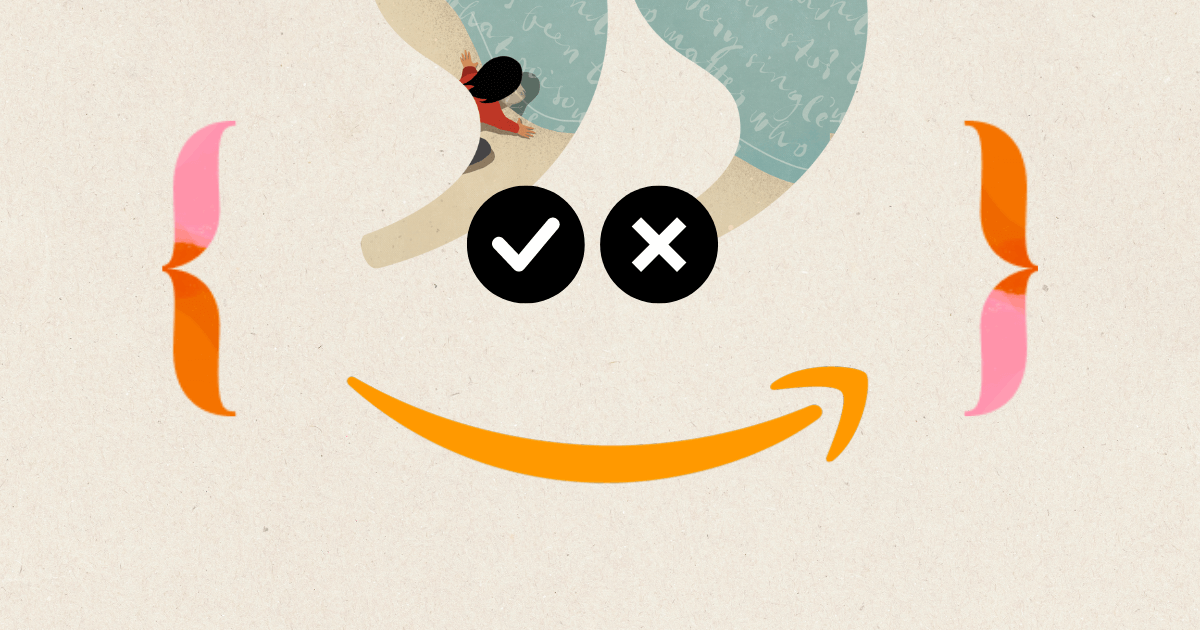
Are you ready to self-publish on Amazon but unsure about going exclusive? What’s the recommended move for indie authors and publishers? Let’s learn about the pros and cons of self-publishing on Amazon KDP Select to help make your best informed decision.
Key Takeaways
- You want to sell on Amazon, the #1 book retailer that captures 60% of the market. However, you also want to maximize your sales potential by reaching the other 40% of the market with channels like Apple Books and Kobo.
- Amazon’s KDP Select program requires you to sell exclusively to them for 90 days. There are a few pros to this program. But if 90 days' worth of non-Amazon royalties matter to you, ditch the exclusivity and publish wide.
- There is a way to reach Amazon and everywhere else. An aggregator like PublishDrive simplifies the process and lets you keep 100% of your net royalties.
Why Self-Publish?
Before getting into the pros and cons of publishing with Amazon, let’s go over the basics. If you already know self-publishing is for you, you can skip to the next section. If you’re learning about what all of this means, know that you’ve got two ways to publish a book: 1) self-publishing or 2) traditional publishing.
Traditional publishing is the old-school way of pitching your manuscript to various publishing houses in hopes of getting signed. Self-publishing skips past the gatekeepers, guaranteeing you get published by taking matters into your own hands. Although you may lack the budget or backing of a traditional management team, many authors found success with self-publishing (like bestselling authors Mark Dawson and Rupi Kaur!)
Here’s a quick breakdown of self-publishing vs. traditional publishing:
|
Self-Publishing |
Traditional Publishing |
|
|
Funds |
You take care of the funding that goes into editing, designing, marketing, and more. (It’s possible to self-publish without spending a dime.) |
The publisher pays for production, distribution, marketing, and more. |
|
Royalties |
You can earn around 60-70% of royalties for most book formats, depending on the store and country. |
You earn around 10% of royalties, depending on the publisher and country. |
|
Rights |
You keep all the rights. You also manage the rights, such as purchasing the copyrights to any artwork used. |
The publisher has the rights to your book. The exact conditions depend on the publisher and contract. |
|
Decisions |
You make all the decisions. |
Management makes all the decisions. |
|
Timing |
Your book can be on the shelves within months. Timing depends on you. |
Once signed, publishing can take several years to get through. |
As you can see, self-publishing asks you to take the driver’s seat. You have more responsibilities as an indie; however, once you start selling, you get to collect a bigger royalty percentage. Maxing out your take-home royalties is one of the main appeals to running a self-publishing business as an authorpreneur.
Now, when it comes to where to self-publish, Amazon can not be missed –
Why Amazon Self-Publishing
Is Amazon publishing worth it? Yes. Amazon is the world’s largest bookstore. The retailer captures a whopping 60% of the book market, reaching every kind of book audience with its ebook, audiobook, and print formats.
Stats to know:
- Amazon generates around $28 billion worldwide from book sales every year, responsible for over 50% of sales, controlling between 50-80% of book distribution in the US.
- Amazon dominates the ebook market by around 70%. Amazon sells 3x more print books than ebooks. Its Audible platform captures around 60% of the audiobook market.
- Amazon’s Kindle Direct Publishing (KDP) is the largest ebook publisher of self-published books. Around 30% of Amazon’s ebook sales are self-published.
And the growth continues year after year. When looking strictly at self-published books, PublishDrive’s 2023 book market stats report how Amazon continued to be a big player in sales growth:
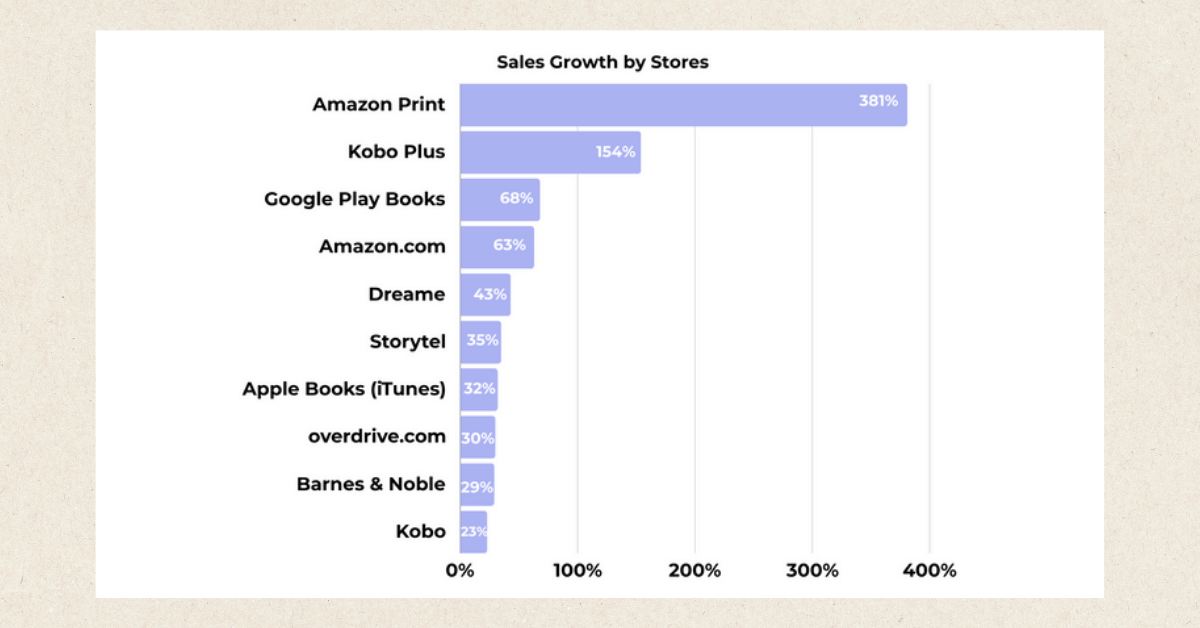
A 381% increase in Amazon print formats is an impressive feat. Other players performed just as well, like Kobo Plus and Google Play Books. What’s lovely to see is the niche app Dreame, which generated 43% more sales in 2023, joining the big retailers. Libraries like Storytel and audio channels like Apple’s iTunes also performed well.
Market stats tell us there’s an entire other half of the book market to reach other than Amazon. But what’s so special about KDP Select?
Pros and Cons of Self-Publishing on Amazon KDP Select
KDP Select is an ebook-only program you can enroll in while uploading your title to Amazon’s self-publishing platform, Kindle Direct Publishing (KDP). When you enroll, your ebook is made available in Kindle Unlimited (KU), a subscription program for readers that allows them to read as many books as they want. To enroll, you must commit to distributing your ebook only through KDP and nowhere else for 90 days. After this period, you can opt out or renew for another 90 days.
Is KDP Select right for you? Without further ado, the pros and cons of Amazon KDP Select –
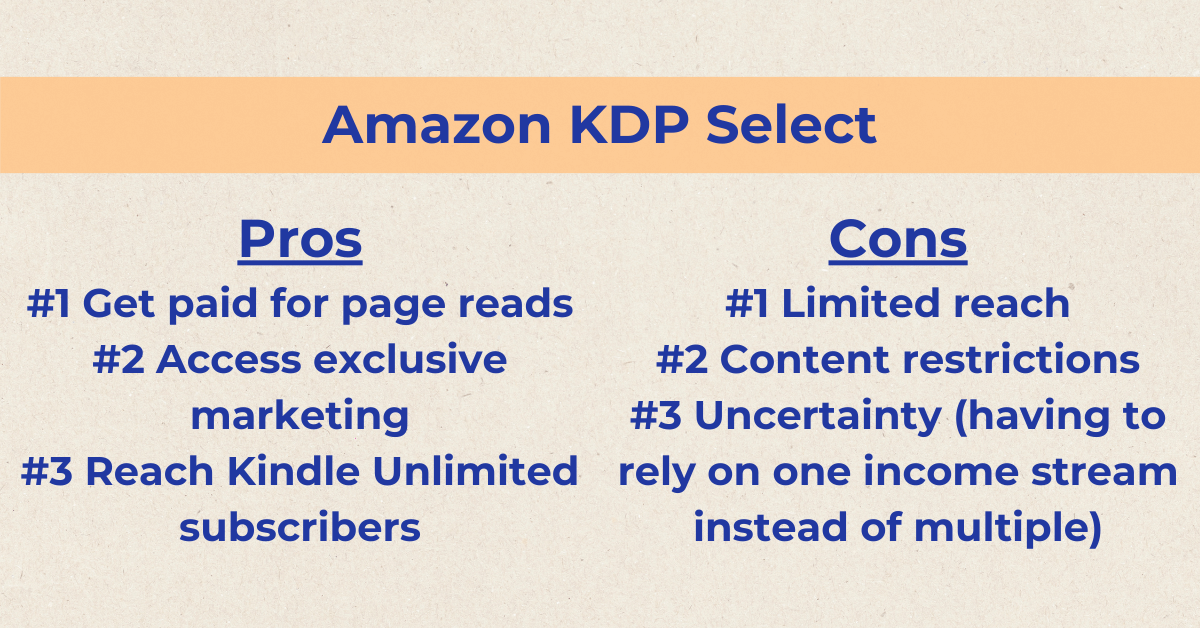
KDP Select Pros
Pro #1: Get paid for page reads
Under Kindle Unlimited, you get paid for every page a reader reads. This can be extra beneficial for established authors with lengthier books. This may not be too profitable if you have a shorter book, but it can be a game-changer if you have a bingeable book series.
Pro #2: Access exclusive marketing
Enrolling in the program gives you exclusive marketing features, such as making your book free or discounted for a limited time. Running sales events is a great way to boost your visibility within Kindle Unlimited.
Pro #3: Reach Kindle Unlimited subscribers
Amazon has never publicly shared the number of subscribers on Kindle Unlimited, but experts estimate around 4.5 million active readers around the globe (12 countries total.) Being available on KU could be an advantage if you already have a solid following of dedicated Kindle readers.
KDP Select Cons
Con #1: Limited reach
Limited reach is the main con to enrolling in KDP Select. Limited reach means not reaching your book’s full sales potential. As mentioned earlier, by distributing your ebook to Amazon only, you miss the other half (40%) of the book market. And keep in mind KU’s average demographic. Do you want to limit yourself to a single channel?
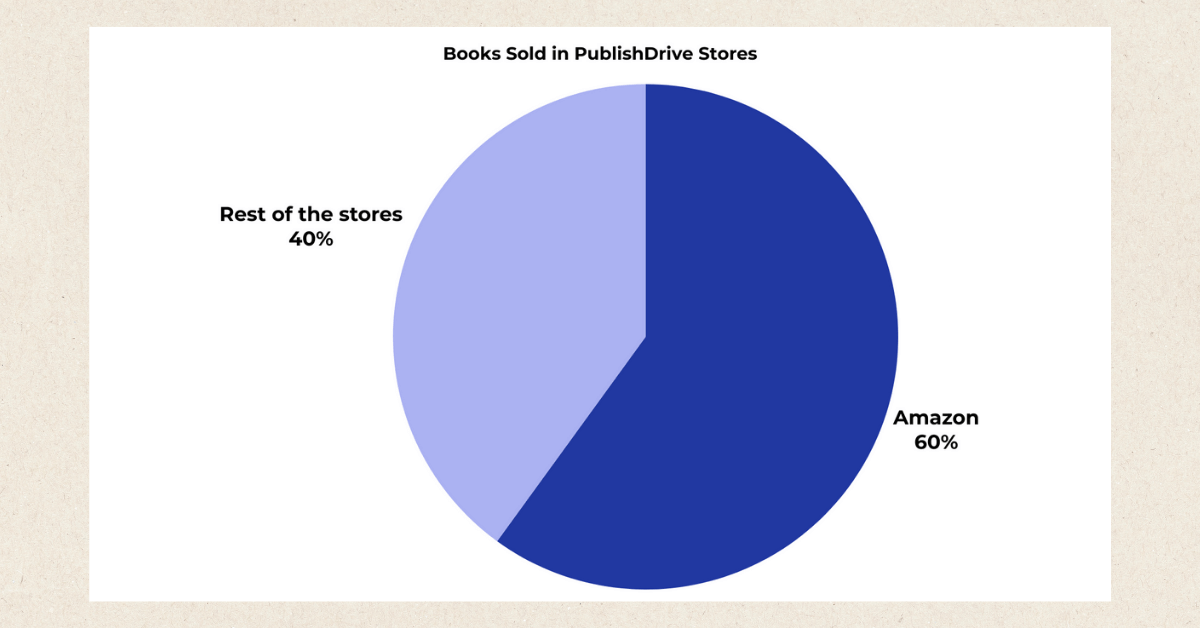
Con #2: Content restrictions
There are certain restrictions to your content when enrolling. For example, you can not post more than 10% of your content anywhere else online, such as in your blog or Wattpad story. Make sure to read through the terms and conditions.
Con #3: Uncertainty
Amazon has been a bit shaky over the years with its constantly changing processes. For example, Amazon updated its book categorization system in 2023, negatively impacting many authors and their books’ discoverability. Authors had to get back to the drawing board and re-do their entire keyword strategy. It was quite a nightmare. You can read more about it here.
Relying on just one source of income for your ebooks may not be a dependable tactic. For a while now, Kindle Select payouts have been getting smaller as competition booms. With other channels rising in popularity (such as the Dreame app), it may be worth investing in a wide strategy for the long run.
All in all, there is no perfect answer to whether KDP Select is for you or not. You have to consider what you write, how many titles you’ve got, who your target audience is, and more. For example, most readers who use KU are in the 24 to 35 age group. If your primary readers are in the 65 to 75 age group reading paperback, KU’s ebook-only program may not make sense for you.
Self-Publishing a Book on Amazon and Beyond
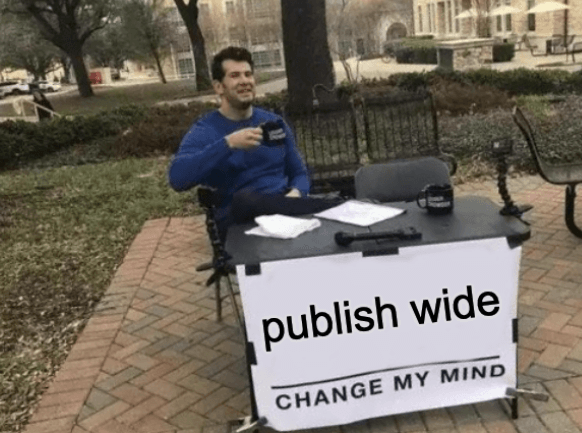
Here are the main benefits of publishing wide:
- Diverse income streams: With multiple platforms, you’re not reliant on a single retailer. If one platform experiences a downturn, your income isn’t entirely affected.
- Adaptability to market changes: You have the flexibility to adjust your distribution strategy according to shifts in market trends and reader preferences, with several platforms at your fingertips.
- Global presence: As digital content continues to grow in demand all around the globe, you tap into various international markets via various platforms.
- Better discoverability: Being present on multiple platforms increases your chances of being discovered by readers through different channels and recommendation systems. Plus, you can reach different types of readers with various print, audiobook, ebook, and even flipbook formats.
- Reduced risk of exclusivity drawbacks: Publishing wide gives you more freedom and control over your content, distribution, and marketing options.
You can go wide with other channels while still publishing through Amazon. You have two ways to do this:
- Go directly to every store: One of the coolest parts about self-publishing is that there are no fees to publish across all the big retailers like Amazon and Apple Books. However, you will need to learn how to navigate each publishing platform, such as how to upload your book files or collect your royalty reports.
- Use an aggregator platform: Managing several stores yourself takes up a lot of time and energy. To optimize your gig, use an aggregator platform to help manage everything for you. An all-in-one platform like PublishDrive makes wide distribution super simple. You can also reach stores that require a 3rd party service like PublishDrive.
When choosing an aggregator, there are two main pricing models to know:
- Royalty share: Most aggregators use royalty share, meaning you give up (usually) another 10% of royalties to the aggregator on top of store royalties.
- Subscription-based: PublishDrive is the first and only aggregator to employ a subscription-based model, where you pay a flat monthly fee for aggregation services. And, you keep 100% of the net royalties you earn. Read how authors earn more with subscription-based aggregation.
To learn more about different aggregators, check out these book aggregators compared.
The Pros of Publishing Wide with PublishDrive
Besides earning more with subscription-based aggregation, what are the other pros of publishing wide with PublishDrive? Well, know that in 2023, indies made 47% more book sales than the previous year. For the past five years, it’s been growth after growth:
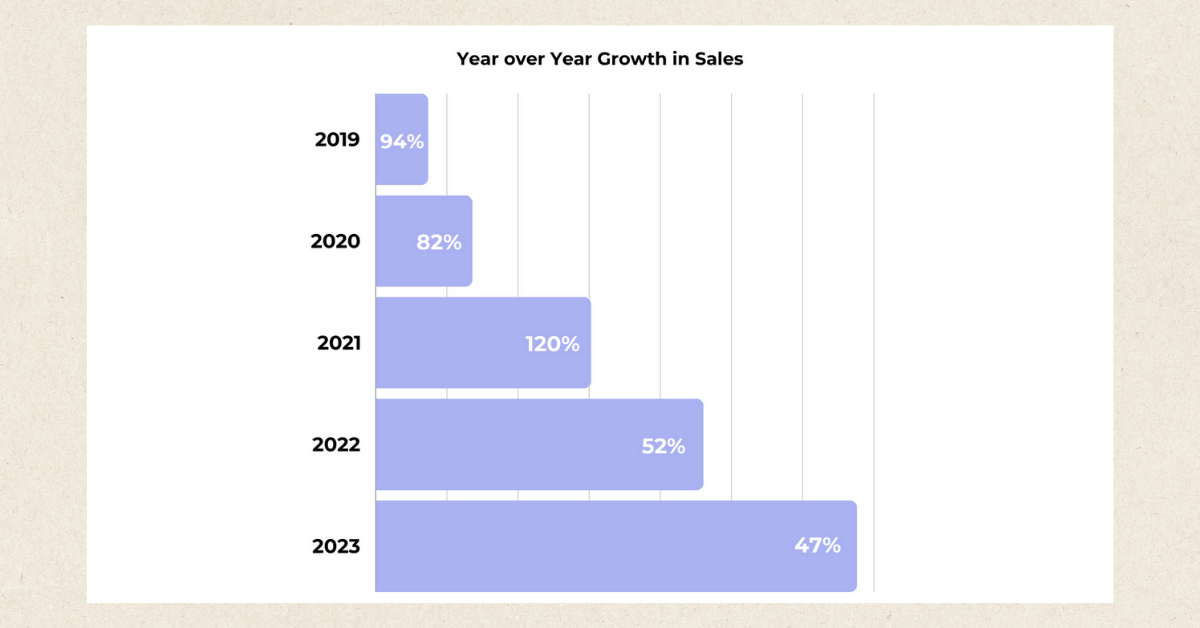
The growth is thanks to PublishDrive’s wide system, where indies get the largest distribution network made up of all the big retailers like Amazon, digital libraries like Bibliotheca, audio apps like Spotify, niche channels like Dreame, and so much more.
What else:
- Optimize your time and energy by taking care of all your distribution activities on one dashboard. See real-time sales data, royalty reports, special store promotion events, and more across all your stores and markets.
- Get all the tools and tech you need to set up your book with ease, like book formatting, conversion, and metadata setup.
- Access exclusive marketing features from running Amazon ads to collecting book reviews. Check out PublishDrive’s promotion success stories.
- Have a team of industry pros who are ready to help you throughout your publishing journey.
Recapping Amazon KDP Pros and Cons
If you’re the type who needs to try everything out at least once, it doesn’t hurt to enroll for 90 days and see how your content performs. But if 90 days’ worth of royalties means a lot, consider maximizing your reach with a wide strategy.
To recap:
- Self-publishing on Amazon pros and cons? Truly, there are no notable cons.
- Is self-publishing on Amazon worth it? Yes. Amazon is the biggest retailer of books.
- Should I publish my book on Amazon KDP Select? That depends on whether the 90 days’ worth of non-Amazon royalties matters to you.
- Can I publish my book on Amazon and other platforms? Yes. You can still self-publish on Amazon without enrolling in KDP Select, allowing you to publish wherever else you’d like.
- Is it worth self-publishing on Amazon with PublishDrive? 110% yes. You can reach Amazon, plus hundreds of other marketplaces, from a single dashboard.
Now you know all about exclusive self-publishing with Amazon pros and cons. What next? ↓
Self-Publish on Amazon & Beyond
Watch how easy it is to reach every market possible with PublishDrive: